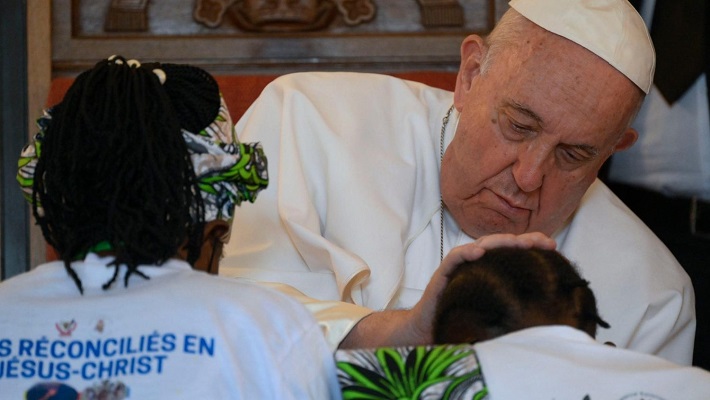By Arnold Neliba
KINSHASA, FEBRUARY 3, 2023 (CISA)-Pope Francis was taken through horrifying testimonies from survivors of the ongoing conflict in the eastern region of the Democratic Republic of Congo.
The survivors shared stories of brutal violence characterized by mass killings, mutilation, abductions rape and sexual slavery, and displacement of people.
“I make a heartfelt appeal to all the people, to all the internal and external organizations that orchestrate war in the Democratic Republic of the Congo in order to plunder, scourge and destabilize the country. You are enriching yourselves through the illegal exploitation of this country’s goods and through the brutal sacrifice of innocent victims. Listen to the cry of their blood, open your ears to the voice of God, who calls you to conversion, and to the voice of your conscience: put away your weapons, put an end to war. Enough! Stop getting rich at the cost of the poor, stop getting rich from resources and money stained with blood,” Pope Francis said when he met the survivors of war in Kinshasa.
“I bless every child, adult, elderly person, all those wounded by the violence in the Democratic Republic of the Congo, and in particular every woman and every mother. And I pray that women, every woman, maybe respected, protected and esteemed,” he said in his address, which called for brotherhood and reconciliation.
According to his program during his apostolic visit to DRC that began on January 31, the pope was to visit Goma, the city in the war-torn eastern DRC on February 1 but due to a resurgence of violence, he resorted to meeting the victims at the nunciature in Kinshasa.
The pontiff was shown details of survivors who were maimed, children conceived during months in captivity by the militias, and symbols of crude instruments used to kill their families.
“We continue to be shocked to hear of the inhumane violence that you have seen with your eyes and personally experienced. We can only weep in silence, for we are left without words. Bunia, Beni-Butembo, Goma, Masisi, Rutshuru, Bukavu, Uvira: these are places that the international media hardly ever mention,” the pope commented on the very painful moment during his trip in DRC.
The peace process in eastern Congo continues to be fragile with armed groups operating in the region standing in the way of lasting resolutions and peace efforts.
History of the war in DRC
According to a local NGO, Eastern Congo Initiative, the first war in DRC was in 1996 when Rwanda and Uganda invaded the region to get rid of perpetrators of the 1994 Rwanda genocide. With the help of the country’s then-opposition leader Laurent Désiré Kabila, toppled the government of Mobutu Sese Seko. Kabila became president and in 1998 ordered Rwandan and Ugandan forces to leave the mineral-rich region.
The second war involved nine countries a year after the first war and involved the same issues. Following the murder of President Kabila in 2001, his son Joseph Kabila was appointed president aged 29. The April 2002 Sun City Agreement, and the subsequent July 2002 Pretoria Accord between Rwanda and Congo, as well as the Luanda Agreement between Uganda and Congo, put an official end to the war as the Transitional Government of the Democratic Republic of the Congo took power in July 2003.
In 2008, the DRC and Rwanda joined forces to root out the (Federation for the Liberation of Rwanda) FDLR in the South and North Kivu provinces.
In January 2009 the National Congress for the Defence of the People (CNDP) split, and as part of a deal between Rwanda and the DRC, Kigali put CNDP leader Laurent Nkunda under house arrest.
The remaining CNDP splinter faction, led by Bosco Ntaganda, was supposed to integrate into the national army. But instead, Ntaganda led a new rebel group, M23, which became active in eastern Congo in 2012.
Ntaganda walked into the US embassy in Kigali in March 2013 and surrendered to the International Criminal Court’s custody. Accused of thirteen counts of war crimes and five counts of crimes against humanity, Ntaganda’s trial is currently underway in The Hague.
The M23 is currently among the armed groups operating in the region. Since late 2021 and escalating in 2022, the rebel group has captured swathes of North Kivu province in the east, forcing hundreds of thousands of people to flee their homes.

